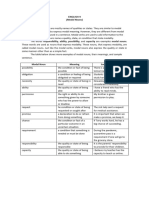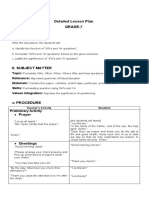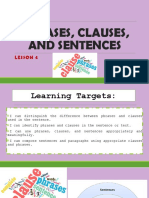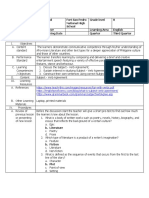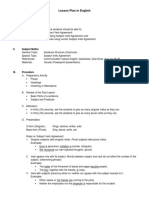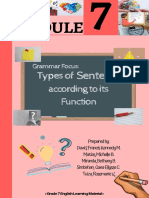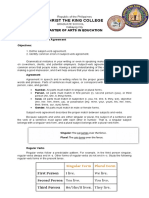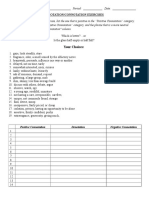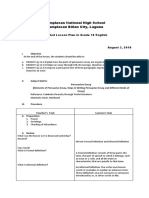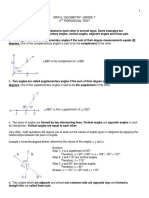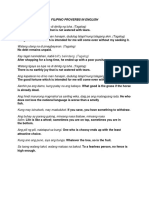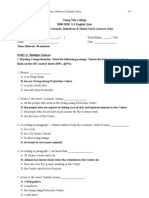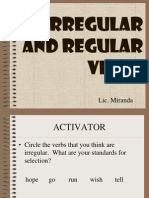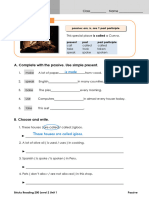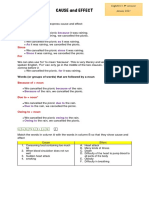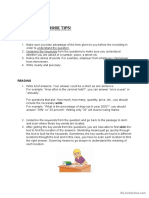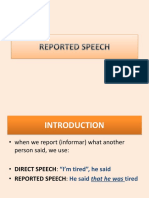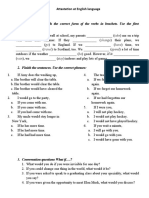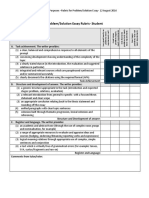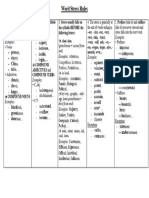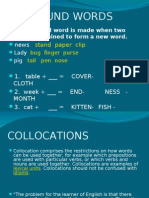Professional Documents
Culture Documents
English Grade 7 - Fourth Quarter
English Grade 7 - Fourth Quarter
Uploaded by
Nanay GiOriginal Description:
Copyright
Available Formats
Share this document
Did you find this document useful?
Is this content inappropriate?
Report this DocumentCopyright:
Available Formats
English Grade 7 - Fourth Quarter
English Grade 7 - Fourth Quarter
Uploaded by
Nanay GiCopyright:
Available Formats
1
PRONOUNS
Pronouns: Subjective, Objective, Possessive, Demonstrative, Reflexive, Relative, and Intensive.
A pronoun is used in place of a noun or nouns. Common pronouns include he, her, him, I, it, me, she,
them, they, us, and we. Here are some examples:
INSTEAD OF: Luma is a good athlete. She is a good athlete. (The pronoun she replaces Luma.)
INSTEAD OF: The beans and tomatoes are fresh-picked. They are fresh-picked. (The
pronoun they replaces the beans and tomatoes.)
Subjective Pronouns Objective Pronouns
A subjective pronoun acts as the subject of a An objective pronoun acts as the object of a
sentence—it performs the action of the verb. The sentence—it receives the action of the verb. The
subjective pronouns are he, I, it, she, they, objective pronouns are her, him, it, me, them, us,
we, and you. and you.
He spends ages looking out the window. Cousin Eldred gave me a trombone.
After lunch, she and I went to the planetarium. Take a picture of him, not us!
Possessive Pronouns Demonstrative Pronouns
A possessive pronoun tells you who owns A demonstrative pronoun points out a noun. The
something. The possessive pronouns are hers, his, its, demonstrative pronouns are that, these,
mine, ours, theirs, and yours. this, and those.
The red basket is mine. That is a good idea.
Yours is on the coffee table. These are hilarious cartoons.
A demonstrative pronoun may look like a
demonstrative adjective, but it is used differently in
a sentence: it acts as a pronoun, taking the place
of a noun.
Interrogative Pronouns Indefinite Pronouns
An interrogative pronoun is used in a question. It An indefinite pronoun refers to an indefinite, or
helps to ask about something. The interrogative general, person or thing. Indefinite pronouns
pronouns are what, which, who, whom, and include all, any, both, each, everyone, few, many,
compound words ending in "ever," such neither, none, nothing, several,
as whatever, whichever, whoever, and whomever. some,and somebody.
What on earth is that? Something smells good.
Who ate the last Fig Newton? Many like salsa with their chips.
An interrogative pronoun may look like an An indefinite pronoun may look like an indefinite
interrogative adjective, but it is used differently in a adjective, but it is used differently in a sentence: it
sentence: it acts as a pronoun, taking the place of acts as a pronoun, taking the place of a noun.
a noun.
Relative Pronouns Reflexive Pronouns
A relative pronoun introduces a clause, or part of a A reflexive pronoun refers back to the subject of a
sentence, that describes a noun. The relative sentence. The reflexive pronouns are herself,
pronouns are that, which, who, and whom. himself, itself, myself, ourselves,
themselves, and yourselves. Each of these words
You should bring the book that you love most. can also act as an intensive pronoun (see below).
That introduces "you love most," which describes
the book. I learned a lot about myself at summer camp.
(Myself refers back to I.)
Hector is a photographer who does great work. They should divide the berries
Who introduces "does great work," which describes among themselves. (Themselves refers back
Hector. to they.)
2
Intensive Pronouns
An intensive pronoun emphasizes its antecedent (the noun that comes before it). The intensive pronouns
are herself, himself, itself, myself, ourselves, themselves, and yourselves. Each of these words can also act
as a reflective pronoun (see above).
I myself don't like eggs.
The queen herself visited our class
Basic English Sentence Patterns
A. Subject-Verb-Object pattern B. Subject – Verb – Indirect Object – Direct Object
Ex. The students have solved some Ex. My sister baked me a birthday cake yesterday.
Mathematics problems.
Exercise A Exercise B
1. That thin girl is drinking milk now. 1. The short man has bought his son some crayons from
the stationery shop.
2. The police caught the robbers yesterday.
2. The driver has just shown the policeman his driving
3. We like our teacher. license.
4. My mother is looking after my baby sister. 3. The nurse gave the patient some medicine.
5. The tall man has just written a letter. 4. My uncle brought me a bouquet of flowers last week.
5. The customer is paying the shopkeeper two hundred
dollars.
C. Subject – Intransitive Verb – (Adverb, D. Subject + Transitive Verb + Direct Object + Object
optional) Complement
Ex. The man coughed (loudly). Ex. He called the teacher a genius.
Exercise C Exercise D
1. The audience laughed. 1. Teaching English is driving Shelley bananas.
2. The guest has arrived. 2. The class elected Jerry president.
3. The children walked down the street. 3. Studying keeps him busy.
4. The waiter hurried away from the door. 4. The lawyer considered the defendant innocent.
5. He runs every morning. 5. The child made her mother happy.
E. Subject--Linking Verb--Subject Complement
Ex. That man is a merchant.
1. His brother became chairman. 4. This soup tastes good.
2. He will remain an officer. 5. I feel sick.
3. The nurse seemed tired. 6. My grandfather looks (or appears) old.
You might also like
- ENGLISH 9 Modal Nouns (Copy)Document2 pagesENGLISH 9 Modal Nouns (Copy)Zay DeNo ratings yet
- LESSON6-Materials and Resources in Teaching PoetryDocument22 pagesLESSON6-Materials and Resources in Teaching PoetryCarina Margallo Celaje100% (1)
- AnalogyDocument50 pagesAnalogyNathaniel Campeciño89% (9)
- SCIENCE GRADE 5-First Quarter ReviewerDocument5 pagesSCIENCE GRADE 5-First Quarter ReviewerNanay Gi100% (20)
- Mother Nature EulogyDocument1 pageMother Nature EulogyNanay Gi100% (2)
- Scholastic Success With Grammar Grade 4Document65 pagesScholastic Success With Grammar Grade 4Nicu Lupu100% (40)
- Reflexive and Intensive PronounsDocument5 pagesReflexive and Intensive PronounsAira Joy Anyayahan100% (1)
- Pronoun-Antecedent Agreement QUIZDocument2 pagesPronoun-Antecedent Agreement QUIZBelle Smith100% (3)
- African Chants and PoemsDocument6 pagesAfrican Chants and PoemsAlita Leal Leguro-Delos Santos100% (1)
- Module Grade 7Document14 pagesModule Grade 7Maricel Cesario TamayoNo ratings yet
- Derived AdjectivesDocument3 pagesDerived AdjectivesNanay Gi67% (6)
- 100 Common Errors in English PDFDocument68 pages100 Common Errors in English PDFKarlitoz Redes85% (20)
- English 7 Learning Activity SheetDocument23 pagesEnglish 7 Learning Activity SheetRosauro Sanchez Jr.No ratings yet
- Verbals QuizDocument3 pagesVerbals Quizapi-310262647No ratings yet
- Ridgewood School of Caloocan, Inc.: Lesson Plan - English 7Document3 pagesRidgewood School of Caloocan, Inc.: Lesson Plan - English 7Hazel Mae HerreraNo ratings yet
- Grade 8 Modal AdverbsDocument2 pagesGrade 8 Modal AdverbsJoshua Lander Soquita Cadayona100% (3)
- Quiz On Reflexive & Intensive PronounDocument6 pagesQuiz On Reflexive & Intensive PronounFJ Marzado Sta MariaNo ratings yet
- Learning ObjectivesDocument4 pagesLearning ObjectivesRoxane RiveraNo ratings yet
- 5W's and 1H QuestionDocument11 pages5W's and 1H QuestionRubelyn MogelloNo ratings yet
- Lesson 4-Phrases, Clauses, SentencesDocument21 pagesLesson 4-Phrases, Clauses, SentencesMary Wayne Arzaga100% (4)
- DLP Grade 9 A Rose For EmilyDocument10 pagesDLP Grade 9 A Rose For EmilyJolina VelascoNo ratings yet
- Department of Education: Detailed Lesson Plan in English 7Document10 pagesDepartment of Education: Detailed Lesson Plan in English 7Elvert Dela CruzNo ratings yet
- Integrated English For Effective Communication Reading and Writing Skills Lesson 1Document1 pageIntegrated English For Effective Communication Reading and Writing Skills Lesson 1Louiegie Mendoza100% (1)
- Sentence Patterns: English For Language TeachersDocument35 pagesSentence Patterns: English For Language TeachersSchahyda Arley100% (2)
- The Parts of A LetterDocument1 pageThe Parts of A Letterzulkefflymd3393100% (2)
- Understanding Local Color - ENGLISH 8Document12 pagesUnderstanding Local Color - ENGLISH 8Ian Rotiquio100% (1)
- Group Activity On Reflexive and Intensive PronounsDocument2 pagesGroup Activity On Reflexive and Intensive PronounsJennefer Gudao Aranilla100% (1)
- Subject Verb Agreement (Valenzuela, Joecelle, D)Document9 pagesSubject Verb Agreement (Valenzuela, Joecelle, D)Cella ValenzuelaNo ratings yet
- How Odin Lost His EyeDocument21 pagesHow Odin Lost His EyeEricka Jenn100% (1)
- Passive and ActiveDocument5 pagesPassive and ActivePhiline Therese CercadoNo ratings yet
- Grade 10 - English Quiz BeeDocument2 pagesGrade 10 - English Quiz BeeShiela Ejurango100% (2)
- Using Verbs When Giving Information and ExplanationsDocument34 pagesUsing Verbs When Giving Information and ExplanationsTeacher Anne Apolinario0% (1)
- Sample LPDocument2 pagesSample LPJuvelene Gaynilo ElpedesNo ratings yet
- 6 English - 1 Functions of NounsDocument9 pages6 English - 1 Functions of NounsRochelle Acala Del RosarioNo ratings yet
- Natural Order Vs Inverted OrderDocument3 pagesNatural Order Vs Inverted OrderAbegail Cachuela50% (2)
- Types of Sentences According To Its FunctionDocument17 pagesTypes of Sentences According To Its FunctionKENN David100% (2)
- Direct and Indirect Speech Grade 8Document21 pagesDirect and Indirect Speech Grade 8Steven Paul Bacanto100% (1)
- Daily Lesson Plan in English 8: I. ObjectivesDocument5 pagesDaily Lesson Plan in English 8: I. ObjectivesCharmaine Hernandez Castillejos67% (3)
- Semi-Detailed Lesson Plan in English 10 Date: - I. ObjectivesDocument4 pagesSemi-Detailed Lesson Plan in English 10 Date: - I. ObjectivesRio S. Solomon100% (2)
- Module 2 Subject Verb AgreementDocument9 pagesModule 2 Subject Verb AgreementAnna Kris DulfoNo ratings yet
- Quiz For Structure of Phrases and SentencesDocument4 pagesQuiz For Structure of Phrases and SentencesJoshua LagonoyNo ratings yet
- Affixes ActivityDocument2 pagesAffixes ActivityKristine Dawn67% (3)
- DIRECT AND INDIRECT SPEECH and STORYDocument3 pagesDIRECT AND INDIRECT SPEECH and STORYRoxanne Cabilin100% (4)
- Semi LP HazeeDocument2 pagesSemi LP HazeeHazel Mae Herrera100% (1)
- Basic Sentence Lesson PlanDocument5 pagesBasic Sentence Lesson PlanRachelle Marie AlejandroNo ratings yet
- Detailed Lesson Plan (DLP) Format: En9Lt-Iiia16 I. ObjectivesDocument2 pagesDetailed Lesson Plan (DLP) Format: En9Lt-Iiia16 I. Objectivesjoel rosal100% (2)
- Connotation Denotation Worksheet 2Document4 pagesConnotation Denotation Worksheet 2Galvez ChaChaNo ratings yet
- English 7-Q1-L18 WorksheetDocument2 pagesEnglish 7-Q1-L18 WorksheetClaude Gonzales100% (1)
- 13N English Lesson Plan in MNHS 2018Document5 pages13N English Lesson Plan in MNHS 2018Ma. Victoria RamosNo ratings yet
- M1 - L2 - 1 - The CentepedeDocument1 pageM1 - L2 - 1 - The CentepedeRamz Latsiv YohgatNo ratings yet
- Nouns-Pronoun and Antecedents....Document9 pagesNouns-Pronoun and Antecedents....Bernard Ortinero100% (1)
- DLP 2 English 10 Moralist ApproachDocument10 pagesDLP 2 English 10 Moralist ApproachAgapitoNo ratings yet
- American Literature ReviewerDocument3 pagesAmerican Literature ReviewerAbby YambaoNo ratings yet
- Verb Mood Lesson PlanDocument4 pagesVerb Mood Lesson Planapi-310262647100% (5)
- Structures of ModificationDocument18 pagesStructures of ModificationNadia RNo ratings yet
- English-Grade 7Document5 pagesEnglish-Grade 7Joel Puruganan Saladino100% (2)
- English 8 Daily Lesson LogDocument3 pagesEnglish 8 Daily Lesson LogMarielle BautistaNo ratings yet
- English: Active and Passive VoiceDocument10 pagesEnglish: Active and Passive VoiceEthan Lance CuNo ratings yet
- 3-12-19 Formulating Meaningful ExpressionsDocument2 pages3-12-19 Formulating Meaningful ExpressionsMarianne Florendo GamillaNo ratings yet
- English7 - Q1 - M2 - Genres-of-Viewing 3Document13 pagesEnglish7 - Q1 - M2 - Genres-of-Viewing 3Mj ManuelNo ratings yet
- English: Quarter 1 - Module 5: Sentence GaloreDocument18 pagesEnglish: Quarter 1 - Module 5: Sentence GaloreZosima AbalosNo ratings yet
- Figure of Speech QuestionsDocument7 pagesFigure of Speech QuestionsMarjBuccatNo ratings yet
- English GrammarDocument44 pagesEnglish GrammarwaleedNo ratings yet
- Pronouns and Verb Latest New 1647056114519Document102 pagesPronouns and Verb Latest New 1647056114519vivek singhNo ratings yet
- The Different Types of NounsDocument18 pagesThe Different Types of NounsL.a.ZumárragaNo ratings yet
- Location of Selected CitiesDocument1 pageLocation of Selected CitiesNanay GiNo ratings yet
- Jesus Unboxed - Know The Truth Be Set FreeDocument2 pagesJesus Unboxed - Know The Truth Be Set FreeNanay GiNo ratings yet
- Height of The FlagpoleDocument2 pagesHeight of The FlagpoleNanay GiNo ratings yet
- Geometry-Grade 7 ReviewerDocument4 pagesGeometry-Grade 7 ReviewerNanay Gi100% (1)
- Polynomials DivisionDocument3 pagesPolynomials DivisionNanay GiNo ratings yet
- NC GLC Doc 2015 0723 Book3Document163 pagesNC GLC Doc 2015 0723 Book3Nanay GiNo ratings yet
- Word Problem ReviewDocument10 pagesWord Problem ReviewGil Mark B TOmasNo ratings yet
- Reviewer Math 3rd Year - Arcs and Angles 3rd QuarterDocument6 pagesReviewer Math 3rd Year - Arcs and Angles 3rd QuarterNanay GiNo ratings yet
- Word Problem ReviewDocument10 pagesWord Problem ReviewGil Mark B TOmasNo ratings yet
- Combined VariationDocument1 pageCombined VariationNanay Gi0% (1)
- Reviewer Math 3rd Year - Arcs and Angles 3rd QuarterDocument6 pagesReviewer Math 3rd Year - Arcs and Angles 3rd QuarterNanay GiNo ratings yet
- CHRISTIAN LIVING Grade 5 - First Periodical ReviewerDocument3 pagesCHRISTIAN LIVING Grade 5 - First Periodical ReviewerNanay Gi100% (2)
- MATH GRADE 8 Part A Factoring and Special ProductsDocument3 pagesMATH GRADE 8 Part A Factoring and Special ProductsNanay Gi42% (12)
- HELE Grade 5-2nd QuarterDocument4 pagesHELE Grade 5-2nd QuarterNanay Gi100% (2)
- Christian Living Grade 8Document2 pagesChristian Living Grade 8Nanay Gi50% (4)
- Completing The Square - ExamplesDocument1 pageCompleting The Square - ExamplesNanay GiNo ratings yet
- Christian Living - REflectionDocument1 pageChristian Living - REflectionNanay GiNo ratings yet
- New Yorker in Tondo - Outline1Document1 pageNew Yorker in Tondo - Outline1Nanay Gi100% (1)
- Filipino Proverbs Tagalod-EnglishDocument1 pageFilipino Proverbs Tagalod-EnglishNanay GiNo ratings yet
- WHY THE SKY IS HIGH Comparison PDFDocument1 pageWHY THE SKY IS HIGH Comparison PDFNanay GiNo ratings yet
- PostulatesDocument1 pagePostulatesNanay GiNo ratings yet
- Categorizing HypothesesDocument2 pagesCategorizing HypothesesNanay GiNo ratings yet
- English - 4th Grading - ReviewerDocument6 pagesEnglish - 4th Grading - ReviewerNanay GiNo ratings yet
- WORK-problem SolvingDocument4 pagesWORK-problem SolvingNanay GiNo ratings yet
- Russian-English English-Russian Dictionary Русско-английский англо-русский словарь (PDFDrive)Document628 pagesRussian-English English-Russian Dictionary Русско-английский англо-русский словарь (PDFDrive)Đani NovakovićNo ratings yet
- TTC S3 English Quiz - Gerunds, Infinitives & Modal Verbs P.1Document5 pagesTTC S3 English Quiz - Gerunds, Infinitives & Modal Verbs P.1api-19992748No ratings yet
- Adj and Adv TestDocument1 pageAdj and Adv TestYến Nguyễn KimNo ratings yet
- Irregular Verbs PowerPointDocument20 pagesIrregular Verbs PowerPointDo Miranda100% (3)
- Bricks Reading 200 - L2 - Grammar SheetDocument20 pagesBricks Reading 200 - L2 - Grammar SheetJIYOON IRIS HUNo ratings yet
- Sentence Subject + VerbDocument3 pagesSentence Subject + Verbsiti rahma maulidaNo ratings yet
- Ingles Bachillerato 2Document4 pagesIngles Bachillerato 2nataliaherreroNo ratings yet
- Talking About SelfDocument19 pagesTalking About SelfGanis Anton SaputroNo ratings yet
- Lecture 3. Expressive Means and Stylistic DevicesDocument10 pagesLecture 3. Expressive Means and Stylistic DevicesLamy MoeNo ratings yet
- This Is My House: Oral PresentationsDocument8 pagesThis Is My House: Oral PresentationsElisabete FerradiniNo ratings yet
- How To PunctuateDocument308 pagesHow To Punctuatetito100% (3)
- Planificare Anuala La Limba EnglezăDocument16 pagesPlanificare Anuala La Limba EnglezăMaricela TopaleaNo ratings yet
- Cause and Effect: ExerciseDocument3 pagesCause and Effect: ExerciseGracia DeaNo ratings yet
- Japanese PronounsDocument11 pagesJapanese PronounsKianaNo ratings yet
- Going For Gold - IntermediateDocument4 pagesGoing For Gold - IntermediateOvidiu VintilăNo ratings yet
- Jefs, JurnalDocument16 pagesJefs, JurnalKadek ArtaNo ratings yet
- Tips For IGCSE ExamsDocument2 pagesTips For IGCSE ExamsPi PiNo ratings yet
- 1-Bachillerato Unit 5 Reported SpeechDocument20 pages1-Bachillerato Unit 5 Reported SpeechMARIA JOSE SÁNCHEZNo ratings yet
- Complete The Text With The Correct Form of The Verbs in Brackets. Use The First ConditionalDocument3 pagesComplete The Text With The Correct Form of The Verbs in Brackets. Use The First ConditionalmaxlabNo ratings yet
- So Do I. Neither Do I.: Ann and Kate Are Twins. They Always Agree With Each OtherDocument2 pagesSo Do I. Neither Do I.: Ann and Kate Are Twins. They Always Agree With Each OtherErnestoJiménezOtero57% (7)
- Instant Download Ebook PDF English For Careers Business Professional and Technical 11th Edition PDF ScribdDocument41 pagesInstant Download Ebook PDF English For Careers Business Professional and Technical 11th Edition PDF Scribdmanuel.king142100% (61)
- 12 AdjectiveDocument17 pages12 AdjectiveMehak SrivastavaNo ratings yet
- ES1103 Rubric For Problem Solution Essay - Student Version - FINALDocument2 pagesES1103 Rubric For Problem Solution Essay - Student Version - FINALSimon Warui100% (2)
- Using The Perfect Tenses: Grade 5 Verbs WorksheetDocument2 pagesUsing The Perfect Tenses: Grade 5 Verbs WorksheetRosalia Busca100% (3)
- Word Stress RulesDocument1 pageWord Stress RulesEplus AcademyNo ratings yet
- Calcutta Girls High School SYLLABUS-2019-20: Class 4-English Paper 1 (Language)Document11 pagesCalcutta Girls High School SYLLABUS-2019-20: Class 4-English Paper 1 (Language)Adhara MukherjeeNo ratings yet
- All From Unit 2 Tkt.Document12 pagesAll From Unit 2 Tkt.libardogonzalezalvar60% (5)
- Lista de VerbosDocument2 pagesLista de VerbosAdamary TrujilloNo ratings yet
